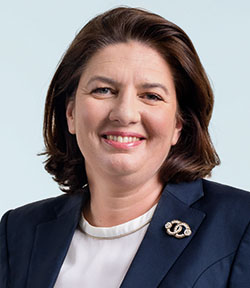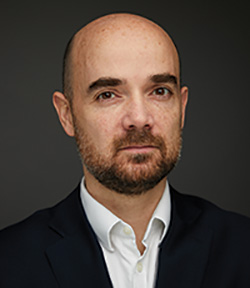Funds Europe talks to leading players in Europe’s robo-advisory market about the next generation of offerings and overcoming the hype.
This year has seen a number of high-profile exits from the robo-advice market (ABN Amro), with some (Investec) citing a lack of demand. But there have also been equally high-profile entrants (JP Morgan and YouInvest).
We asked three participants in Europe’s robo market – fintech ResonanceX, which offers structured products via robo services; Amundi, which recently acquired French robo-adviser WeSave; and German private bank M.M Warburg, which has its own robo offering – to comment on the current state of the market and what we should expect from the next generation of robo-advisers.
HARITON KOROZIS, CEO, RESONANCEX
How do you describe the state of the robo-advisory market?
The market rapidly reached maturity and the plethora of solutions have a hard time differentiating and isolating competitive advantages. We are on the verge of realising the potential of true large-scale application, as the big banking, asset management and wealth management players can choose among robust solutions to use or acquire. However, larger players with existing network effects have the ability to effect drastic landscape changes – we’ve been recently witnessing a race to zero fees – so innovators don’t have time to blink if they are looking to succeed.
Is there a place for robo-advice in the institutional investment market?
There most definitely is a place in the institutional market – just not in the same shape and form. Our focus in ResonanceX is reimagining the hybrid model for professional investors like private banks – how super-advisers can be empowered by next-generation technologies to deliver robust advice that include complex investment solutions, from structured products to the rest of the alternatives investments. We are beginning with structured products and already have a client in Europe.
How can technology improve current robo-offerings and what innovations should we expect in the next generation of robo-offerings?
We have so far only seen the first act in the application of tech to advice. There are four big drivers: (1) personalisation, where the investment decisions can accommodate more of the individual investor’s needs, views and values (see ESG or vegan investments), (2) commoditisation, where automation allows transparent access to sophisticated products – until now only reserved to limited investors due to heavily manual investment and lifecycle workflows, (3) increased access to a much wider investor audience due to the rise of global wealth platforms, and (4) better transparency in the robo-decisions, enhancing explainability and avoiding biases
 VALÉRIE BAUDSON, CEO, CPR ASSET MANAGEMENT
VALÉRIE BAUDSON, CEO, CPR ASSET MANAGEMENT
How would you describe the state of the robo-advisory market?
While more and more new players have emerged in the market in the last few years and throughout the world, offering discretionary portfolio management at a lower cost, often through ETFs, the robo-advisory market still has a lot to give to individuals and corporates. The enforcement of new regulations (PSD2, MiFID II) is uncovering a whole new array of customer and market needs, and the rise of open banking is giving robo-advisers keys to address these needs, thus creating numerous new challenges and opportunities for robo-advisers to fulfil their potential.
Is there a place for robo-advice in the institutional investment market?
Robo-advice is still mostly retail-oriented. However, institutional players are showing more and more interest for reporting and data-visualisation capabilities.
Have the services developed to a second generation or are we still at primitive chatbot status?
At first, robo-advisers brought significant added value to customers through the clarity of the offer and a simple approach to investing with no paperwork, and cost-efficiency. This is why robo-advisers developed discretionary portfolio management solutions, often using ETFs in their portfolios. However, robo-advisers have understood that the products they developed were only part of the answer: customers are not only seeking cost-efficient and well-performing new ways of investing, they also want guidance on their existing investment accounts. Moreover, individual investors want to take part in the investment process, taking informed decisions alongside their human advisers.
How can technology improve current robo-offerings and what innovations should we expect in the next generation of robo-offerings?
Digitalisation and open banking have allowed robo-advisers to create extensive web platforms, making a huge profusion of information available for everyone. While this informational abundance is totally unprecedented and extremely valuable, the implementation of natural language processing will lead to a more valuable revolution.
 JAN KÜHNE, CDO, M.M WARBURG
JAN KÜHNE, CDO, M.M WARBURG
Is the robo-advisory market overhyped or yet to fulfil its potential?
We still regard the robo-advisory market in Europe as being in a rather early phase. Even though market expectations have not yet been met, we remain convinced of its strategic importance. There will be a consolidation of the market which will be especially to the detriment of fintech providers, who are suffering particularly from the high customer acquisition costs in pure online marketing. The aim here is to supplement digital offerings and innovative solutions with analogue touchpoints in order to increase the conversion rate. Traditional banks and their existing relationship combined with digital channels are particularly suitable for successfully implementing this hybrid approach.
Is there a place for robo-advice in institutional investment or is it purely a retail/wealth management play?
Interestingly, the concepts largely applied by robo-advisers derive from the asset management for institutional clients. With more possibilities for individualisation in private wealth, portfolio management will presumably converge even further in conceptual terms. Likewise, digital tools for modelling portfolios, visualising scenarios and ongoing reporting will become increasingly important for institutional clients. These will not only be of general importance for the client relationship but a decisive differentiating element in the foreseeable future. Moreover, we already see new digital ways in which asset managers can distribute their know-how that go beyond the administration of portfolios via funds or managed accounts. This also applies to the increasing importance of online marketing in B2B business. Nevertheless, we do not see a purely online play for institutional clients in the future either.
Have the services developed to a second generation or are we still at primitive chatbot status?
In the last few years, the robos have focused primarily on the areas of lead generation in online and content marketing, user experience and customer journey with the primary goal of optimising conversion rates. More recently, we have observed the increased integration of offline interactions within the digital offering, such as telephone appointments or onsite onboardings, from fintech providers and banks. We believe the current distinction between classic and digital asset management will not prevail and that digital and analogue services will instead converge. The intelligent use of technology will play an important role here.
How can technology improve current robo-offerings and what innovations should we expect in the next generation of robo-offerings?
With regard to UX and educational content, we will see a continuous enhancement. On the customer side, the question of the underlying asset management approaches, the expertise of the people involved and the differences in the various approaches has often played a very subordinate part. We assume that this will change with a more mature market and better-informed investors. The individualisation of portfolios can enhance this development. The use of individual securities allows these approaches to individualisation to be refined even further.
©2019 funds europe





